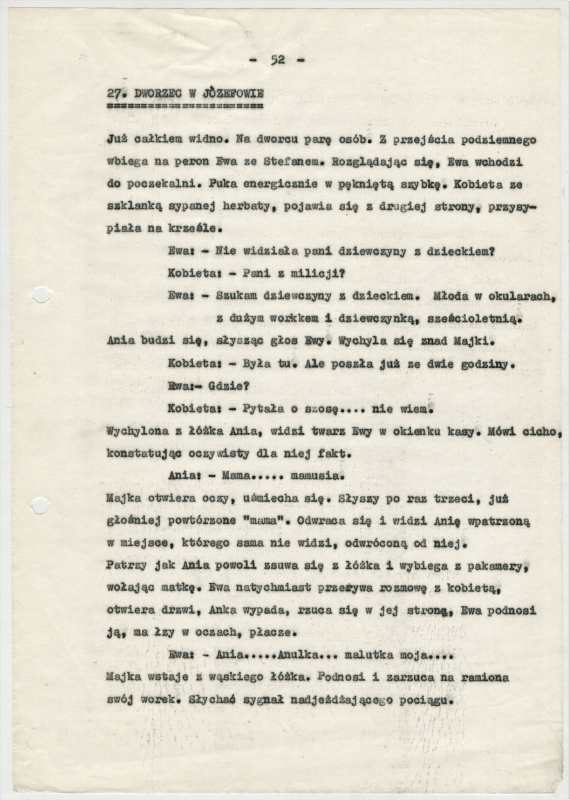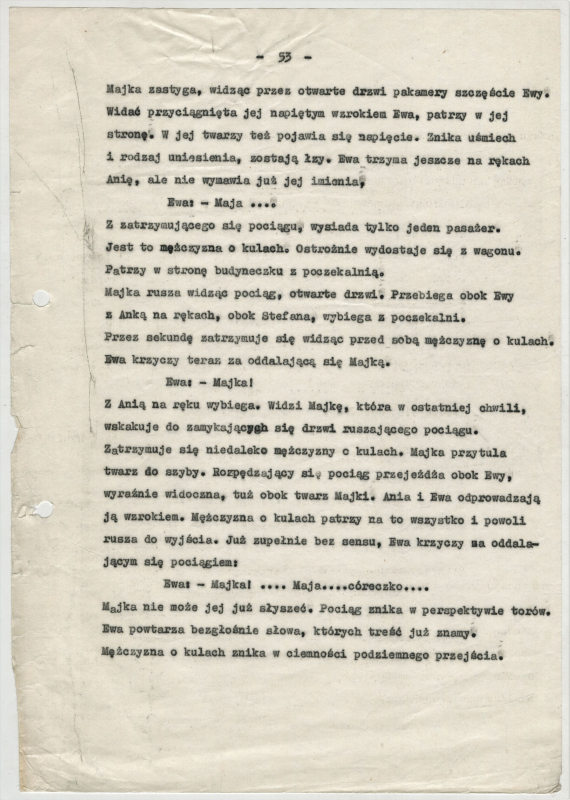Train Station in Józefów
A suburban train station on the so-called Otwock Line. The characteristic winged shelter and waiting room were built when the line was electrified in 1936–38.
Decalogue Seven
The culminating scene in this gripping drama unfolds at a train station. Maja (Maja Berełkowska)—a young woman robbed of her motherhood by parents whom she no longer trusts or is close to—leaps aboard a departing train, leaving behind the child that has once again been taken from her. This scene brings to mind another one in Kieślowski’s Blind Chance, in which the main character, Witek Długosz, runs to catch a departing train, with the result of the chase affecting the outcome of the plot’s three different versions. Witek is played by Bogusław Linda, who in Decalogue Seven performs the role of Wojtek, Ania’s dad, who has also been deprived of his child. But perhaps it he who allowed his child to be taken away from him? His conspicuous absence during the crucial events at the train station is more than meaningful. In the journal Kieślowski kept during the making of The Double Life of Veronique, his next film after The Decalogue, the director wrote that he hated shooting scenes at train stations and in trains, and yet he continued to write both locations into each new screenplay. Kieślowski also revealed in an interview that he didn’t like this episode of The Decalogue.
Mikołaj Jazdon
“Sarah and Hagar”
When it was discovered that Sarah, wife of the patriarch of our faith, Abraham, could not bear children, her slave Hagar was “appointed” to give birth to the family’s offspring. The husband was the biological father, and the wife was the child’s legal mother. Such was the biblical custom, and other women, including the wives of the patriarch Jacob, solved the problem of their infertility in this manner. The Roman legal maxims pater semper incertus (“The father is always uncertain”) and its corollary mater semper certa (a statement of certainty regarding biological motherhood) say as much, but here the roles of the parents—legal and biological—are reversed. The Latin statements postulate (albeit unenthusiastically) the superiority of the real function of fatherhood over biological “possession,” which is associated with the mother; the opposite is true in the Bible: the Patriarch provides the seed, and his wife plays the dominant role of the mother, though the biological wet nurse (servant) cares for the child and performs the necessary functions. The emphasis is placed not on biology, but on social roles. The same is true of another biblical custom, that of levirate marriage: the brother of a deceased childless man is required to sire a son with the widow in order to “preserve his name”; the dead man becomes the child’s father (not biologically, of course).
Today, in an era of unprecedented advancements in the field of prenatal medicine and the growing social acceptance for new forms of adoption, let us think back to the biblical models that are as relevant today as they ever were. The crux of the conflict between Sarah and Hagar was not the supposed clash between biology and motherhood as an institution, but jealousy over each woman’s position in the family and society, and the matter of inheritance. God protected both rights for the good of the children. He also sent us Kieślowski to ask the question: Are children property?

